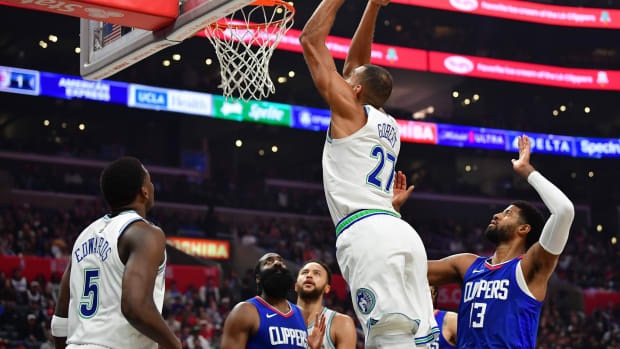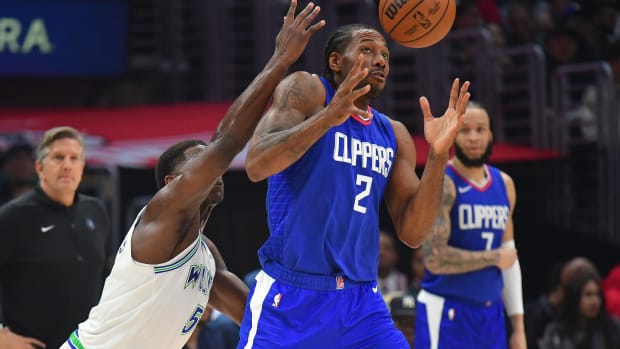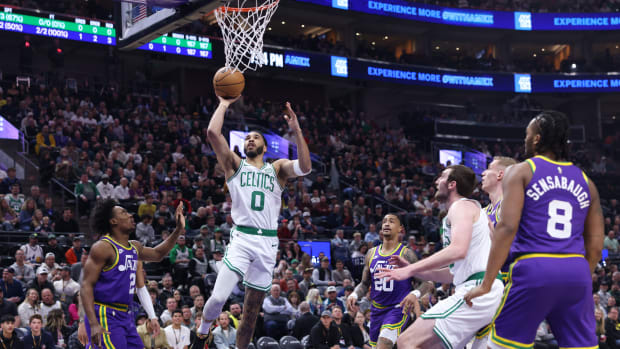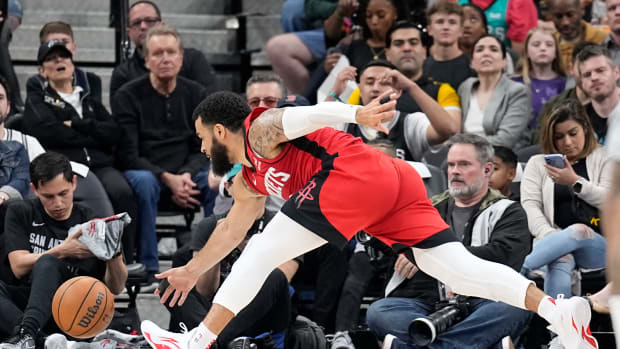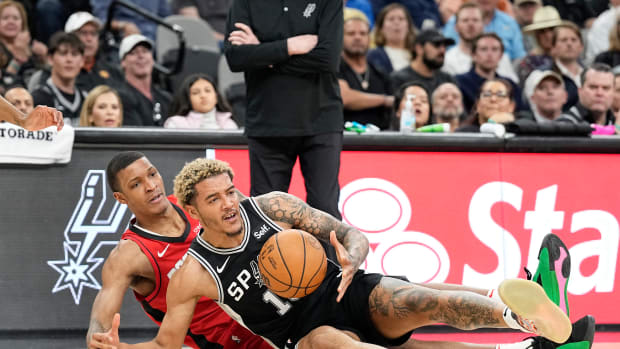Within hours of Kyle Rittenhouse’s acquittal last Friday came a pointed rejoinder from the NBA, the world’s most progressive pro sports league.
“Our thoughts are with the families of those whose lives were taken in this tragedy,” said the statement from James Cadogan, executive director of the NBA’s new Social Justice Coalition. “The right to peacefully protest is a bedrock of our democracy, and the National Basketball Social Justice Coalition remains committed to preserving that right for all. Any forms of vigilantism in our society are unacceptable.”
In three sentences, the NBA made absolutely clear where it stood: sympathy for the people gunned down by Rittenhouse, support for the protests demanding police accountability, condemnation of Rittenhouse’s deadly law-enforcement cosplaying.
It was precisely the message we’ve come to expect from the NBA, a league that has publicly championed the Black Lives Matter movement and all it entails—police reform, voter empowerment and racial equity, and social justice at large.
How, then, do we reconcile last week’s statement from the league with the others we recently heard attached to a powerful NBA figure?
“These [n-words] need a [n-word].” “I don’t like diversity.” “Do I own you? Are you one of mine?”
Those three sentences were allegedly uttered by the Suns’ majority owner, Robert Sarver, according to an ESPN investigative report published earlier this month. The story, built on interviews with 70-plus current and former Suns employees, documented an extensive and appalling history of racism, misogyny and verbally abusive behavior by Sarver. The NBA has commissioned a law firm to conduct its own investigation but is reserving judgment until that report is complete. Sarver has denied most of the allegations.
The contrast provides a stark and useful reminder: that the NBA is not some monolithic institution; that progressive-minded league officials, like commissioner Adam Silver, do not necessarily share the same values as the billionaire owners who run the league; and that those owners perhaps should not always be trusted on statements of social justice—no matter how many they issued amid the George Floyd protests in the summer of 2020.
For those who viewed those pledges with suspicion—more public relations than principle—the Sarver story only sharpened the skepticism. And evoked a heavy sigh.
“You have to remember that professional sports is a business, and we’ve seen commerce trump principle far too often,” says Len Elmore, the former NBA player, broadcaster and lawyer who is now a senior lecturer in Columbia University’s sports management program. “Oftentimes,” Elmore notes, “leagues say all the right things in many ways to placate their employees.”
And the NBA, of course, is a league whose most important employee pool is primarily composed of Black athletes—about 75–80% of all players in any given season. In this league, “Black Lives Matter” is much more than a slogan, as evidenced by the swell of player activism that followed Floyd’s death last year. When team owners followed suit, it was as much a gesture of support for their players as it was a sudden political awakening.
Nearly every NBA franchise issued statements expressing some combination of sympathy and outrage over Floyd’s death at the hands of a Minneapolis police officer. Many called for police reform.
One of those statements came from Sarver’s two teams, the Suns and the WNBA’s Phoenix Mercury. It invoked the phrases “social injustice and systemic racism,” cited the deaths of Floyd, Breonna Taylor and Ahmaud Arbery and decried “the brutality driven by hate and prejudice.” It pledged support for those who “fight for justice, inclusion and the suppression of bigotry.”
Meanwhile, the man in charge of those two franchises was allegedly (and repeatedly) dropping the n-word in casual conversation, bemoaning calls for diversity and marginalizing women and people of color in his organization.
While the anecdotes were shocking, the revelation was not entirely surprising to players who have been around the league during Sarver’s 17 years as Suns owner.
“This did not surprise me one bit,” Hall of Famer Paul Pierce said last week on The Crossover podcast. “If you go ask older players of my generation, this wouldn’t surprise them one bit.”
Although Pierce said he had not personally heard Sarver say anything racist, “This is something that’s been talked [about] amongst players. … The whispers get out. People talk about what type of owners, what type of people they are, and that’s something that’s been mentioned about Robert Sarver.”
Former All-Star Baron Davis, who retired in 2012, alluded to something similar in a recent interview with TMZ, citing his own experiences with Sarver during the ’11 labor talks. And former NBA center Etan Thomas, who was part of the union’s executive committee for those talks, says of Sarver, “He has a reputation; I’ll say that.”
“I’m not saying that I heard him say the n-word,” Thomas tells Sports Illustrated. “But he has a reputation where hearing this is not a surprise.”
Just 16 months ago, Sarver might have been labeled—whether as a compliment (by BLM supporters) or an insult (by right-wing pundits)—as another “woke” member of the NBA’s social-justice movement, by virtue of his team’s statements and his mere association with a league that has made these issues a priority.
The National Basketball Social Justice Coalition that Cadogan now leads was in fact conceived in response to the wildcat player strike that briefly stopped the 2020 playoffs. That strike, of course, was spurred by the shooting of Jacob Blake by Kenosha, Wis., police—the very incident that sparked the protests where Rittenhouse, a 17-year-old from Antioch, Ill., shot three people with a semiautomatic rifle, killing two of them.
As part of his role, Cadogan vigorously lobbied Congress this fall to pass the George Floyd Justice in Policing Act and the John R. Lewis Voting Rights Advancement Act—underlining once more the league’s broad commitment to these causes. And yet many of the owners who are funding Cadogan’s group were simultaneously contributing millions to Republican politicians who staunchly oppose those same efforts.
Indeed, NBA owners (and their significant others) put nearly $15 million into the coffers of Republican politicians and PACs from 2015 to ’20, according to reporting by The Ringer. Last year alone, the DeVos family, which owns the Magic, contributed nearly $500,000 to super PACs supporting Republican congress members and Donald Trump specifically, according to the Federal Election Commission records analyzed by The Ringer. The list of major contributors to Republican PACs during the five-year period also included the owners of the Cavaliers (Dan Gilbert), Knicks (James Dolan), Spurs (the Holt family), Rockets (Tilman Fertitta) and Sixers (Josh Harris). Also on that list is the Heat’s Micky Arison, who happens to be a sitting member of the NBA’s Social Justice Coalition.
Further down the list was Sarver, who contributed $179,000 to Republicans during the five-year period.
Postscript: The George Floyd Justice in Policing Act stalled out in the Senate in September, amid unanimous opposition from Republicans, after passing through the House with mostly Democratic support. The John R. Lewis Voting Rights Act, championed by Democrats, died in the Senate in November, after passing through the House on a slim margin.
So, to review: An NBA-funded coalition lobbied to pass new laws on police reform and voting rights, only to see its efforts defeated by a political party that’s generously supported by a subset of NBA owners.
To Elmore, it raises a necessary question about the NBA’s purported progressivism: “Is it legitimate, as opposed to merely performative?” Or is this merely the difference between the league as an institution (“the NBA”) versus its individual components (team owners)?
Those owners are of course entitled to contribute to whichever candidates and causes they choose. But it’s impossible to reconcile their Black Lives Matter press releases with their anti-social-justice donations.
“It’s easy to come to the forefront when it’s comfortable and it’s the right time … because that’s what everybody is doing,” Pierce says. “It’s easy to make yourself look good. It’s easy to throw money out there to help a cause. But that doesn’t mean it changes the person or who you are.”
Many NBA owners do, in fact, put their money where their tweets are. Mark Cuban (Mavericks), Vivek Randive (Kings), Jeanie Buss (Lakers) and Marc Lasry (Bucks) generally support progressive candidates and causes and have been outspoken on social-justice issues. But the NBA is not only Cuban and Lasry, or LeBron James or Jaylen Brown or Steve Kerr or Doc Rivers, no matter how often those voices are heard. The league’s true power resides with the collective billionaires who run it—especially when it comes to policing their own.
So now the NBA faces another test of its collective conscience: what to do about Sarver. They have been here before, of course: in 2014, when longtime Clippers owner Donald Sterling was banned for life and forced to sell the team after making racist remarks. That case was unique and straightforward: Sterling’s remarks were taped and disclosed publicly. His players were threatening to boycott a playoff game. Sponsors were fleeing.
To date, there are no threats or boycotts involving the Suns and no secret tapes of Sarver. Just the recollections of 70-plus current and former employees, most of them anonymous. But those interviews paint a clear picture, one you would expect to be confirmed by the NBA’s investigators. And the result should be just as obvious.
“The message has to be clear that this is not acceptable,” Thomas says. “And I think, me personally, that Sarver should be removed.” Anything short of that, he says, would render the NBA’s social-justice efforts “null and void.”
Thomas adds, “You got to take a clear position and that will determine and affect Adam Silver’s legacy.”
The investigation is ongoing. A final report could be weeks or months away.
If it were up to Silver alone, Elmore theorized, then Sarver would certainly be banished with the same swiftness and certitude as Sterling was. But Silver is not the NBA, and the NBA is not the purely progressive institution it often purports to be.
If the allegations against Sarver prove true, his earlier social-justice posturing can be seen only as counterfeit. And if the NBA allows him to stay, you can dismiss the rest of their statements, too.
More SI Daily Covers:
• Guns, Drugs and Football Thugs
• Bowl Season is Coming. And There Are Only 36 Pylons Left.
• He Should be in High School. Instead He's in the G League. And He's the Future.


































